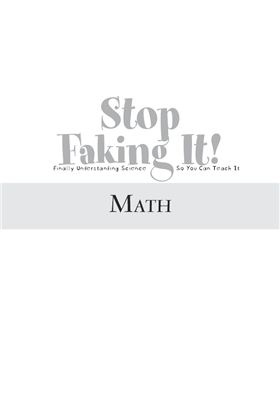National Science Teachers Association, 2006. - 190 pages.
Flummoxed by formulas? Queasy about equations? Perturbed by pi? Now you can stop cursing over calculus and start cackling over Math, the newest volume in Bill Robertson's accurate and amusing Stop Faking It! books. Like the other six titles in this award-winning NSTA Press series, Math is meant for homework-helping parents, math-averse science teachers, and homeschoolers. It's written for everyone who lacks the background to teach with confidence and is sick of relying on avoidance strategies. As Robertson sees it, too many people view mathematics as a set of rules to be followed, procedures to memorize, and theorems to apply. This book takes a unique approach by focusing on the reasoning behind the rules, from math basics all the way up to a brief introduction to calculus. Among the questions it covers: Why do you 'carry' numbers when adding? Why do you need a common denominator when adding fractions? (Robertson says you don't, by the way!) What's behind the process of cross-multiplying? Where does the number pi come from? And who in the heck invented those strange formulas for area and volume? As usual, Robertson provides clear explanations, irreverent illustrations, and easy-to-follow activities. But he spares you problem sets to do or tests to take. That's because Math is not so much a book that will help you do math as it is a guide to understanding it conceptually.
Flummoxed by formulas? Queasy about equations? Perturbed by pi? Now you can stop cursing over calculus and start cackling over Math, the newest volume in Bill Robertson's accurate and amusing Stop Faking It! books. Like the other six titles in this award-winning NSTA Press series, Math is meant for homework-helping parents, math-averse science teachers, and homeschoolers. It's written for everyone who lacks the background to teach with confidence and is sick of relying on avoidance strategies. As Robertson sees it, too many people view mathematics as a set of rules to be followed, procedures to memorize, and theorems to apply. This book takes a unique approach by focusing on the reasoning behind the rules, from math basics all the way up to a brief introduction to calculus. Among the questions it covers: Why do you 'carry' numbers when adding? Why do you need a common denominator when adding fractions? (Robertson says you don't, by the way!) What's behind the process of cross-multiplying? Where does the number pi come from? And who in the heck invented those strange formulas for area and volume? As usual, Robertson provides clear explanations, irreverent illustrations, and easy-to-follow activities. But he spares you problem sets to do or tests to take. That's because Math is not so much a book that will help you do math as it is a guide to understanding it conceptually.

